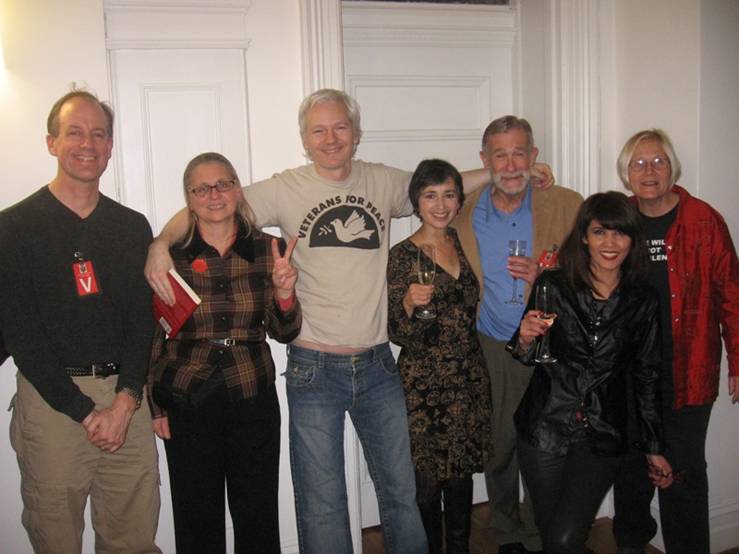The final punishment of Julian Assange reminds journalists their job is to uncover what the state keeps hidden
If we do our job, we will expose the same vile mendacity of our masters that has led to the clamour of hatred towards Assange, Manning and Snowden
By Robert Fisk
May 30, 2019 "Information Clearing House" -
I’m getting a bit tired of the US Espionage Act. For that matter, I’ve been pretty weary of the Julian Assange andChelsea Manning saga for a long time. No one wants to talk about their personalities because no one seems to like them very much – even those who have benefited journalistically from their revelations.
From the start, I’ve been worried about the effect of Wikileaks, not on the brutal western governments whose activities it has disclosed in shocking detail (especially in the Middle East) but on the practice of journalism. When we scribes were served up this Wikileaks pottage, we jumped in, paddled around and splashed the walls of reporting with our cries of horror. And we forgot that real investigative journalism was about the dogged pursuit of truth through one’s own sources rather than upsetting a bowl of secrets in front of readers, secrets which Assange and co – rather than us – had chosen to make public.
Why was it, I do recall asking myself almost 10 years ago, that we could read the indiscretions of so many Arabs or Americans but so few Israelis? Just who was mixing the soup we were supposed to eat? What had been left out of the gruel?
But the last few days have convinced me that there is something far more obvious about the incarceration of Assange and the re-jailing of Manning. And it has nothing to do with betrayal or treachery or any supposed catastrophic damage to our security.
In The Washington Post this week, we’ve had Marc Theissen, a former White House speechwriter who defended CIA torture as “lawful and morally just”, telling us that Assange “is not a journalist. He is a spy … He engaged in espionage against the United States. And he has no remorse for the harm he has caused.” So forget that Trump’s insanity has already turned torture and secret relations with America’s enemies into a pastime.
So let’s forget – just for a moment – the slaughter of civilians, the lethal cruelty of US mercenaries (some involved in child-trafficking), the killing of Reuters staff by US forces in Baghdad, the army of innocents held in Guantanamo, the torture, the official lies, the fake casualty figures, the embassy lies, the American training of Egypt’s torturers and all the other crimes uncovered by the activities of Assange and Manning.
Let’s suppose that what they revealed was good rather than bad, that the diplomatic and military documents provided a shining example of a great and moral country and demonstrated those very noble and shining ideals which the land of the free has always espoused. Let’s pretend that US forces in Iraq repeatedly gave their lives to protect civilians, that they denounced their allies’ tortures, that they treated the inmates of Abu Ghraib (many of them completely innocent) not with sexual cruelty but with respect and kindness; that they broke the power of the mercenaries and sent them back to prison in the US in chains; that they owned up, however apologetically, to the cemeteries of men, women and children whom they sent to an early grave in the Iraq war.
Better still, let’s just think for a moment how we might have reacted to the revelation that the Americans had not killed these tens of thousands of people, had never tortured a soul, that the prisoners of Guantanamo – every man jack of them – were provably sadistic, cowardly, xenophobic, racist mass murderers, the evidence of their crimes against humanity proved before the fairest courts in the land. Let’s even fantasise for a moment that the US helicopter crew who cut down 12 civilians in a Baghdad street did not “waste” them with its guns. Let’s imagine that the voice on the helicopter radio cried: “Wait, I think these guys are civilians – and that gun might just be a television camera. Don’t shoot!”
As we all know, this is escapism. For what these hundreds of thousands of documents represented was the shaming of America, its politicians, its soldiers, its torturers, its diplomats. There was even an element of farce which, I suspect, enraged the Thiessens of this world even more than the most terrible of revelations. I’ll always remember the outrage expressed by Hillary Clinton when it was revealed that she had sent her flunkies to spy on the United Nations; her State Department slaves had to study the encryption details of delegates, credit card transactions, even frequent flyer cards. But who on this earth would want to waste their time studying the tosh emanating from the UN’s hopelessly incompetent staff? Or, for that matter, who in the CIA wasted their time listening to Angela Merkel’s private telephone conversations with Ban Ki Moon?
One of the cables Assange revealed went right back to the 1979 Iranian revolution and attache Bruce Laingen’s assessment that “the Persian psyche is an overriding egoism”. Interesting, but Iranian students had painstakingly stuck together all the shredded US embassy papers in Tehran in the years after 1979, and had already published Laingen’s words decades before Wikileaks gave them to us. So vast was the first 250,000-document hoard – which Hillary denounced as “an attack on the international community” while still calling the papers “alleged documents” (as if they might be a hoax) – that few could discover what was new and what was old. Thus The New York Times breathlessly highlighted the Laingen quote as if it was an extraordinary scoop.
Some of the material was not so obvious before – the suggestion that Syria had allowed anti-American insurgents to pass through its territory from Lebanon, for example, was absolutely correct – but the “evidence” of Iranian bomb-making in southern Iraq was far more doubtful. This story had already been happily farmed out to The New York Timesby Pentagon officials in February 2007, to be reheated in more recent years, but was largely nonsense. Iranian military equipment had been lying around all over Iraq since the 1980-88 Iran-Iraq war and most of the bomb-makers who used it were Iraqi Sunni Muslims.
But this is nitpicking amid the garbage tip of paper. Such tomfoolery is insignificant compared to the monstrous revelations of American cruelty; the account, for example, of how US troops killed almost 700 civilians for coming too close to their checkpoints, including pregnant women and the mentally ill.
And the instruction to US forces – this bit of history from Chelsea Manning – not to investigate when their Iraqi military allies whipped prisoners with heavy cables, hung them from ceiling hooks, bored holes into their legs with electric drills and sexually assaulted them. In the secret US assessment of 109,000 deaths in Iraq and Afghanistan (itself a gross underestimation), 66,081 were officially classified as non-combatants. What, I wonder, would have been the American reaction to the killing of 66,000 US citizens, 20 times more than the dead of 9/11?
None of this, of course, were we supposed to know. And you can see why not.
The worst of this material was secret not because it accidentally slipped into a military administration file marked “confidential” or “for your eyes only”, but because it represented the cover-up of state crime on a massive scale.
Those responsible for these atrocities should now be on trial, extradited from wherever they are hiding and imprisoned for their crimes against humanity. But no, we are going to punish the leakers – however pathetic we may regard their motives.
Sure, we journalists, we folk from “reputable news organisations”, may worry about the implications of all this for our profession. But far better we hunt down other truths, equally frightening for authority. Why not find out, for example, what Mike Pompeo said in private to Mohammed bin Salman? What toxic promises Donald Trump may have made to Netanyahu? What relations the US still secretly maintains with Iran, why it has even kept up important contact – desultory, silently and covertly – with elements of the Syrian regime?
Why wait 10 years for the next Assange to drive up to us with another dumper truck of state secrets?
But the usual red warning light: what we find out through the old conventional journalism of foot-slogging, of history via deep throats or trusted contacts, is going to reveal – if we do our job – just the same vile mendacity of our masters that has led to the clamour of hatred towards Assange and Manning and, indeed, Edward Snowden. We’re not going to be arraigned because the prosecution of these three set a dangerous legal precedent. But we’ll be persecuted for the same reasons: because what we shall disclose will inevitably prove that our governments and those of our allies commit war crimes; and those responsible for these iniquities will try to make us pay for such indiscretion with a life behind bars.
Shame and the fear of accountability for what has been done by our “security” authorities, not the law-breaking of leakers, is what this is all about.
This article was originally published by "The Independent "-
http://www.informationclearinghouse.info/51687.htm







